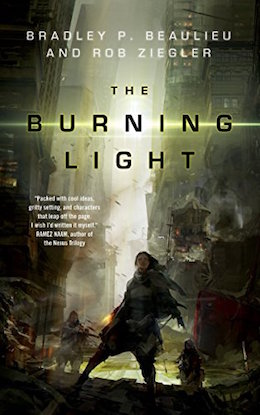To be honest, I’m not sure I know what to make of The Burning Light. It’s well-written. It’s tense up until the conclusion. And then it leaves me completely unsatisfied with its lack of catharsis.
Bradley P. Beaulieu is perhaps best known for his fantasy novels, while Rob Ziegler has one science fiction novel in print and another forthcoming. The Burning Light is a seamless piece of collaboration, with a distinct voice of its own.
Colonel Melody Chu is a ruthless—and disgraced—government operative. Exiled with a small team to the flooded ruins of New York City, her job is to end the threat posed by something called the Light. The Light is like a drug, or an epidemic: its users become addicted, ever more strung out and ever more disconnected from the mind-network that human civilisation presently relies upon. It’s a high that burns people out, that kills. Chu lost her sister to the Light, and she’s dedicated her life since to its eradication.
Zola used to be a pilot, at the peak of her career, guiding dozens of ships through the network from her comfortable apartment. Then she found the Light—or the Light found her. Now she looks like any other Light junkie, living a precarious existence on the margins of society. But Zola’s special: for Chu, she’s the Light vector that got away. Chu will do whatever it takes to track her down, and Zola can’t hide forever.
The novel alternates point of view between Chu and Zola. They’re both appealing characters, in their own way. Chu’s ruthlessness has tragedy at its root, and Zola, with her fellow Light-addict lover Marco—who’s a “medium,” a vector through whom other people access the Light—seems to be playing a part in a quiet tragedy of addiction and inevitability. But Beaulieu and Ziegler haven’t written anything as domestic as a story of addiction and law enforcement in the post-climate-change, post-national future. (Although that’d be an interesting and worthwhile story in its own right, and one I might even have enjoyed more.)
Spoilers ahead.
The Burning Light uses two different ways to talk about the Light. For Chu, it’s a drug or a virus, a dangerous infiltrator, an external threat. In Zola’s perspective, the language used is more that of religion, of ecstatic experience. Although there is a thread of threat in there, too: a lurking sense of the alien.
It turns out that the Light is neither drug nor religion, but some emergent property of the global mind-network. A sort of sentience, rising out of that connectivity, but a sentience that has no idea that its emergence is killing the people that constitute the network. Zola can midwife its birth, or she can strangle it back down into temporary quiescence—if Chu doesn’t kill her first.
The Burning Light is an interestingly novel take on the long-standing SFnal trope of the Singularity. It’s smoothly written. From an emotional perspective, in terms of my investment in its outcome, too smoothly. It feels… frictionless. Despite my interest in Zola and Chu as characters, they’re only compelling because they’re both in different ways obsessed with something neither of them understand. The Light itself is the lynchpin of the novel. Once the Light ceases to be alien, once it becomes even partially explicable, the novel unravels. Once Chu and Zola co-operate, why do I care, now? There’s no cost left, no resolution to that thread of tragedy wound all through The Burning Light. Catharsis, denied.
I wasn’t expecting things to end well. It screws with my sense of tragic foreshadowing. The Burning Light doesn’t give me a sense of emotional resolution. It left me disappointed.
That doesn’t make it a bad book. It just makes it one that doesn’t work for me.
The Burning Light is available from Tor.com Publishing.
Read an excerpt from the novella here on Tor.com.
Liz Bourke is a cranky person who reads books. She holds a Ph.D in Classics from Trinity College, Dublin. Find her at her blog. Or her Twitter.










